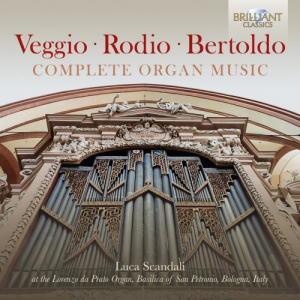Luca Scandali - Veggio, Rodio, Bertoldo: Complete Organ Music '2021
24bit

| Artist | Luca Scandali Related artists |
| Album name | Veggio, Rodio, Bertoldo: Complete Organ Music |
| Country | |
| Date | 2021 |
| Genre | Classical Organ |
| Play time | 01:39:37 |
| Format / Bitrate | 24 BIT Stereo 2429 Kbps / 96 kHz |
| Media | WEB |
| Size | 477 mb / 1.83 gb |
| Price | Download $8.95 |
Order this album and it will be available for purchase and further download within 12 hours
Pre-order album Tracks list
Tracks list
Tracklist 01. Veggio Recercar Del Primo Tono 02. Veggio Recercada Prima Del Primo Tono Per B Mole 03. Veggio Recercar Del Quinto Tono Per B Mole 04. Veggio La Fugitive 05. Veggio Recercada Per B Quadro Del Quarto Tono 06. Veggio Recercada Per B Mol Del Primo Tono 07. Veggio Recercada Per B Quadro Del Primo Tono 08. Rodio Ricercata Prima 09. Rodio Fantasia Sopra, Ave Maris Stella 10. Rodio Seconda Ricercata 11. Rodio Fantasia Sopra, Salve Regina 12. Rodio Terza Ricercata 13. Rodio Fantasia Sopra, La Mi Re Fa Mi Re, Sa Spagna 14. Rodio Quarta Ricercata 15. Rodio Fantasia Sopra, Iste Confessor 16. Rodio Quinta Ricercata 17. Bertoldo Toccata Prima 18. Bertoldo Ricercar Del Primo Tuono 19. Bertoldo Hor Vienza Vien 20. Bertoldo Ricercar Del Terzo Tuono 21. Bertoldo Canzon Francese 22. Bertoldo Un Gai Berger 23. Bertoldo Petit Fleur 24. Bertoldo Ricercar Del Sesto Tuono 25. Bertoldo Frais E Gagliard 26. Bertoldo Toccata Seconda This recording presents three composers active in the 16th century: Claudio Veggio, Rocco Rodio and Sperindio Bertolo. Their Canzones and Ricercatas are intabulations (instrumental arrangements) of well-known chansons. The polyphonic structure of the vocal models is intabulated and elaborated with «passaggi» which tend to be concentrated for the most part in the upper voice. A trio of 16th-century Italian organist composers, two of them almost entirely new to the record catalogues. The name of Claudio Veggio (1510-1543) would hardly be known were it not for the survival of the Manoscritto di Castell’Arquato, one of the earliest and most important collections of Italian keyboard music from the first half of the 16th century. The manuscript’s many ricercari, mass movements, Magnificats, motets, chansons, dances and madrigal intabulations are the work of composers almost forgotten today, but Scandali’s performances on a historically fitting organ give Veggio’s music a new lease of life. The six ricercari show strong affinities with the works in the same genre by the better-known Cavazzoni; his only other surviving work is a four-part harmonisation of a song, La fugitiva. Dating from the following generation, the Bari-born Rocco Rodio (c.1535-after 1615) enjoys marginally fuller representation on disc, but this is still the first complete collection of his surviving work for organ, which is preserved by a Libro di Ricercate published in Naples in 1575. This volume is a historical landmark in its own right, as the first known printed edition of instrumental music in open score. His vocal music was also published in Rome and Venice, but Rodio appears to have made his career in Naples, and these organ works share the extrovert quality and awareness of contemporary developments demonstrated by Neapolitan composers which would in due course come to make the city known as the ‘conservatoire of Europe’. Our third composer is the Modenese composer Sperindio Bertoldo, born like Rodio around 1530 but dying considerably earlier, in 1570. The Brilliant Classics catalogue of Italian organ music is unrivalled in its reach and depth; this is the label’s second recording of Bertoldo’s organ music after Manuel Tomadin’s recent album (95874) which received an enthusiastic welcome from the Dutch Klassieke Zaken journal: Tomadin’s performances are ‘Imaginative, compelling and closely related to the vocal music that is so important in the renaissance.’ Luca Scandali plays an organ built by Lorenzo da Prato (1471-75) in the Basilica of San Petronio, Bologna. The organ has been well maintained through its history and was sympathetically restored in the 1970s, making it an ideal instrument on which to appreciate the colours and mixtures which these 16th-century organist-composers had in mind. The booklet includes a specification of the organ plus contextual notes on the lives and careers of the composers. Luca Scandali, organ Mauro Morini, sackbut
